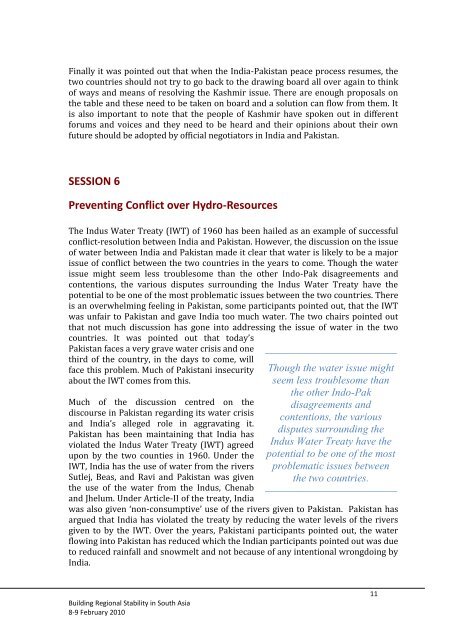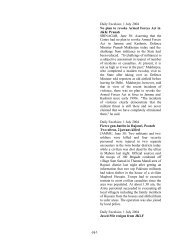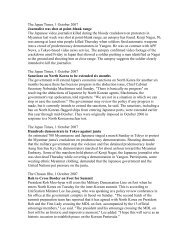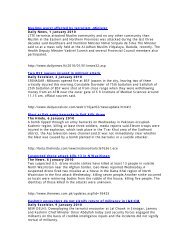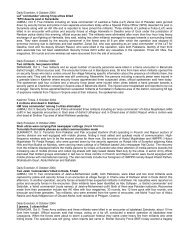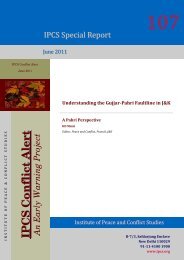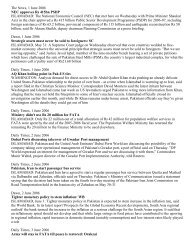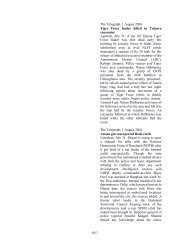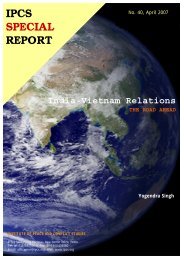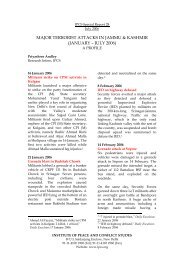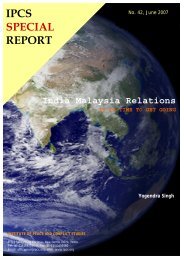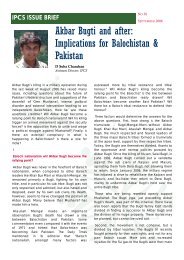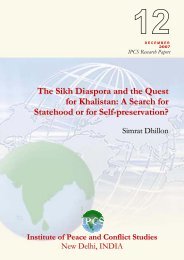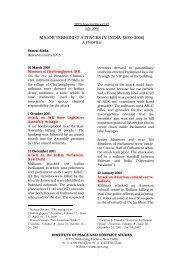PowerPoint Template - Institute of Peace and Conflict Studies
PowerPoint Template - Institute of Peace and Conflict Studies
PowerPoint Template - Institute of Peace and Conflict Studies
You also want an ePaper? Increase the reach of your titles
YUMPU automatically turns print PDFs into web optimized ePapers that Google loves.
Finally it was pointed out that when the India-Pakistan peace process resumes, the<br />
two countries should not try to go back to the drawing board all over again to think<br />
<strong>of</strong> ways <strong>and</strong> means <strong>of</strong> resolving the Kashmir issue. There are enough proposals on<br />
the table <strong>and</strong> these need to be taken on board <strong>and</strong> a solution can flow from them. It<br />
is also important to note that the people <strong>of</strong> Kashmir have spoken out in different<br />
forums <strong>and</strong> voices <strong>and</strong> they need to be heard <strong>and</strong> their opinions about their own<br />
future should be adopted by <strong>of</strong>ficial negotiators in India <strong>and</strong> Pakistan.<br />
SESSION 6<br />
Preventing <strong>Conflict</strong> over Hydro-Resources<br />
The Indus Water Treaty (IWT) <strong>of</strong> 1960 has been hailed as an example <strong>of</strong> successful<br />
conflict-resolution between India <strong>and</strong> Pakistan. However, the discussion on the issue<br />
<strong>of</strong> water between India <strong>and</strong> Pakistan made it clear that water is likely to be a major<br />
issue <strong>of</strong> conflict between the two countries in the years to come. Though the water<br />
issue might seem less troublesome than the other Indo-Pak disagreements <strong>and</strong><br />
contentions, the various disputes surrounding the Indus Water Treaty have the<br />
potential to be one <strong>of</strong> the most problematic issues between the two countries. There<br />
is an overwhelming feeling in Pakistan, some participants pointed out, that the IWT<br />
was unfair to Pakistan <strong>and</strong> gave India too much water. The two chairs pointed out<br />
that not much discussion has gone into addressing the issue <strong>of</strong> water in the two<br />
countries. It was pointed out that today’s<br />
Pakistan faces a very grave water crisis <strong>and</strong> one<br />
third <strong>of</strong> the country, in the days to come, will<br />
face this problem. Much <strong>of</strong> Pakistani insecurity<br />
about the IWT comes from this.<br />
Much <strong>of</strong> the discussion centred on the<br />
discourse in Pakistan regarding its water crisis<br />
<strong>and</strong> India’s alleged role in aggravating it.<br />
Pakistan has been maintaining that India has<br />
violated the Indus Water Treaty (IWT) agreed<br />
upon by the two counties in 1960. Under the<br />
IWT, India has the use <strong>of</strong> water from the rivers<br />
Sutlej, Beas, <strong>and</strong> Ravi <strong>and</strong> Pakistan was given<br />
the use <strong>of</strong> the water from the Indus, Chenab<br />
<strong>and</strong> Jhelum. Under Article-II <strong>of</strong> the treaty, India<br />
Though the water issue might<br />
seem less troublesome than<br />
the other Indo-Pak<br />
disagreements <strong>and</strong><br />
contentions, the various<br />
disputes surrounding the<br />
Indus Water Treaty have the<br />
potential to be one <strong>of</strong> the most<br />
problematic issues between<br />
the two countries.<br />
was also given ‘non-consumptive’ use <strong>of</strong> the rivers given to Pakistan. Pakistan has<br />
argued that India has violated the treaty by reducing the water levels <strong>of</strong> the rivers<br />
given to by the IWT. Over the years, Pakistani participants pointed out, the water<br />
flowing into Pakistan has reduced which the Indian participants pointed out was due<br />
to reduced rainfall <strong>and</strong> snowmelt <strong>and</strong> not because <strong>of</strong> any intentional wrongdoing by<br />
India.<br />
Building Regional Stability in South Asia<br />
8-9 February 2010<br />
11


